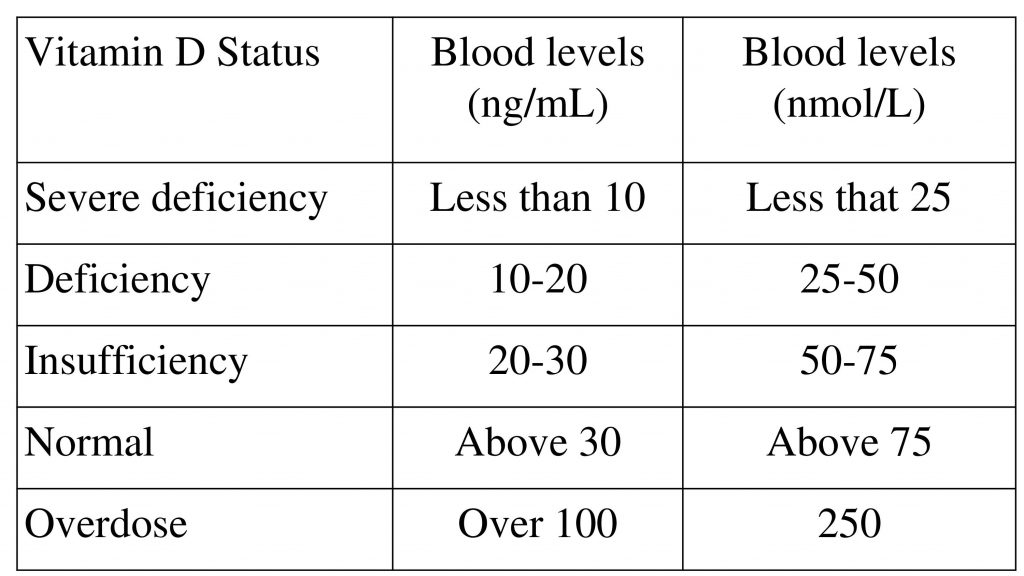 Vitamin D is an important steroid hormone in human nutrition. Vitamin D can be synthesised in the skin or consumed in the diet. Once present in the blood, vitamin D is hydroxylated to 25-hydroxyvitamin D in the liver. The circulating levels of 25-hydroxyvitamin D are what is measured to show vitamin D status. The recommendations are to maintain 25-hydroxyvitamin D levels above 30 ng/mL (75 nmol/L) as this level of 25-hydroxyvitamin D is considered to provides optimal metabolic function. Lower levels can lead to an insufficient or deficient state (deficiency being more severe) and higher levels can lead to toxicity. Studies suggest that blood levels of 25-hydroxyvitamin D are lower in the obese, but the reason for this is not clear. It has been suggested that lower sun exposure, lower dietary intake, a larger tissue mass for distribution, or a more rapid clearance could be the explanation for this association. More than one of these factors could of course play a role in this observed phenomenon.
Vitamin D is an important steroid hormone in human nutrition. Vitamin D can be synthesised in the skin or consumed in the diet. Once present in the blood, vitamin D is hydroxylated to 25-hydroxyvitamin D in the liver. The circulating levels of 25-hydroxyvitamin D are what is measured to show vitamin D status. The recommendations are to maintain 25-hydroxyvitamin D levels above 30 ng/mL (75 nmol/L) as this level of 25-hydroxyvitamin D is considered to provides optimal metabolic function. Lower levels can lead to an insufficient or deficient state (deficiency being more severe) and higher levels can lead to toxicity. Studies suggest that blood levels of 25-hydroxyvitamin D are lower in the obese, but the reason for this is not clear. It has been suggested that lower sun exposure, lower dietary intake, a larger tissue mass for distribution, or a more rapid clearance could be the explanation for this association. More than one of these factors could of course play a role in this observed phenomenon.
A small scale observational study investigated the vitamin D status of a group of British men and women in South Yorkshire. The study subjects were a mixture of normal and overweight individuals that were between the ages of 25 and 75 years. Subjects were assessed for their 25-hydroxyvitamin D levels in the summer, spring and autumn months. The results of the study showed that 25-hydroxyvitamin D levels were lower in overweight and obese individuals when compared to normal weight individuals in the autumn and spring, but not during winter. However, blood 25-hydroxyvitamin D levels were inversely associated with body mass index. Therefore these results support the contention that overweight individuals have lower levels of 25-hydroxyvitamin D than normal weight individuals. There was no difference in the half-life of 25-hydroxyvitamin D between subjects of different weights, and so more rapid metabolic clearance may not be the cause of the differing blood levels. The similarity in winter levels between obese and normal weight individuals may just reflect very low levels in both groups.
Eat Well, Stay Healthy, Protect Yourself
RdB

